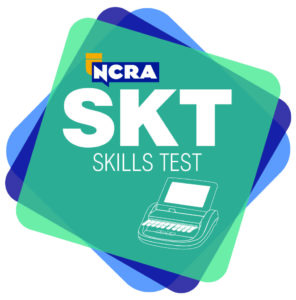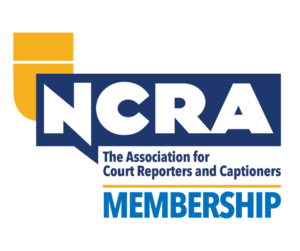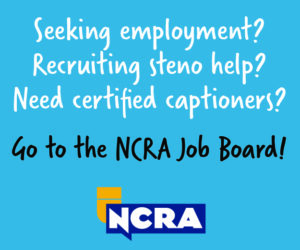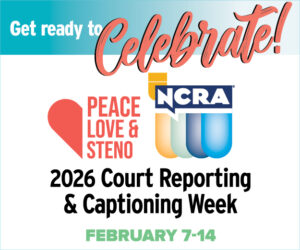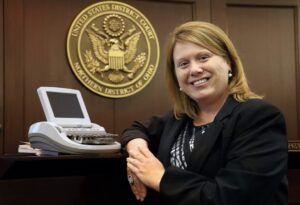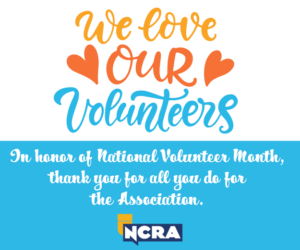
Top, L-R: Terri Sims, RDR, CRR; Lisa Selby-Brood, RMR; Lisa Johnston, RMR, CRR, CRC; Santo (Joe) Aurelio, FAPR, RDR (Ret.); and Cassy Kerr, RPR, CRR, CRC
Do you have the time to give back to your profession? Can you provide the advice and encouragement that students and new professionals need to thrive? As part of National Career Development Month, NCRA invites all members to consider volunteering for its Virtual Mentor Program (VMP). We are looking for a few (or more!) good mentors.
NCRA’s VMP offers a way for court reporting professionals, students, and new professionals to participate in a mentoring relationship in a virtual setting. Mentors and mentees are matched through the program and are introduced via email. Mentors function as coaches, role models, and resources to mentees.
“At NCRA’s annual Conference in Orlando, I saw and heard how much court reporters care for our students.” said Cynthia Ducar, NCRA’s Professional Development Program Manager, “Our court reporting students need your support, and most importantly, they need your time and expertise. Meaningful mentoring can make a difference in the trajectory of our students.”
“The NCRA Virtual Mentoring Program works diligently to match those seeking mentorship with an appropriate mentor. And we need more mentors!” said Ducar.
The JCR recently reached out to several of our mentors to ask them about their experiences.
Lisa Johnston, RMR, CRR, CRC — CART captioner from Melbourne, Fla. | Mentor since 2015
JCR | What inspired you to become a mentor?
LJ | I had a mentor myself, and it was extremely helpful and encouraging to ask someone who has been on the journey that I strived for. I wanted to give back and help anyone who was looking for a cheerleader.
JCR | What is the most rewarding thing about being a mentor?
LJ | I have been in this career for 37 years, and to this day I love what I do. If I can help and motivate a court reporting/captioning student and get them excited and to stay positive and motivated and not to give up, that is rewarding.
JCR | What is the most challenging thing about being a mentor?
LJ | I feel bad when a student feels down and discouraged. I tell them to not lose hope when they are having challenges and can’t seem to pass speed tests. “Never give up, never surrender” — a quote from one of my favorite movies, Galaxy Quest. Make your dream a reality.
JCR | Is there anything else you’d like to share?
LJ | This profession is what I was meant to do. I absolutely love being a CART captioner. And I loved court reporting. I’ll continue to be involved with NCRA’s Virtual Mentor Program. I’m often asked, “When are you going to retire?” Why retire when I’m doing something I love? Life is good! 🙂
Terri Sims, RDR, CRR — Official from Akron, Ohio | Mentor since 2019
JCR | What inspired you to become a mentor?
TS | I was inspired to become a mentor mainly because most students nowadays attend school virtually, and I think having a mentor available to them who is a working professional is very important to help them along their journey.
JCR | What is the most rewarding thing about being a mentor?
TS | For me, the most rewarding thing about being a mentor is being there to celebrate each speed milestone they achieve – especially when they’ve overcome a plateau. It’s helpful to the students to understand that we, as working reporters, have all been there and we understand the struggles that they face. I am there to provide guidance and encouragement.
JCR | What is the most challenging thing about being a mentor?
TS | I would say the most challenging thing about being a mentor is that my advice is not always what someone wants to hear, such as practice, practice, practice. With the shortage of court reporters, I feel it is necessary to do whatever we can to keep this profession alive and well. I have only been a mentor to students thus far but would love to mentor brand-new reporters.
JCR | Is there anything else you’d like to share?
TS | When I was a new reporter starting out in this field, I worked with some phenomenal reporters. They were never too busy to answer a question or give me advice. I credit much of my success in this field to the guidance that I received from the wonderful people I had the pleasure of working with when I started out. I learned so much from them. If I can do that for someone else, it will truly be my honor.
Santo (Joe) Aurelio, FAPR, RDR (Ret.) — from Arlington, Mass. | Mentor since 1953
JCR | How long have you been a mentor?
JA | I’ve been a mentor since 1953 when I was a soldier in Korea and worked as a courts-martial reporter.
JCR | What inspired you to become a mentor?
JA | I was inspired to be a mentor because I felt that I had to help others.
JCR | What is the most rewarding thing about being a mentor?
JA | The most rewarding thing about being a mentor is that I knew that I was helping them.
JCR | What is the most challenging thing about being a mentor?
JA | The most challenging thing about being a mentor is having the patience of Job in continuing to instruct them. Why? Because very few students become reporters. It’s mucho difficult. I know that, and that’s why I give each mentee my very best.
JCR | Is there anything else you’d like to share?
JA | Yes, I have something to share. Court reporting has done everything for me, and that’s why I must continue to help all students and reporters. I don’t expect or want thank-yous. I do this because I have to.
Jennifer Melius, RPR — Freelancer from Longmont, Colo. | Mentor since 2017
JCR | What inspired you to become a mentor?
JM | I remember finishing school and feeling overwhelmed with everything I needed to know to start working as a freelancer. I surrounded myself with some great mentors, and they are a huge part of the reason I am where I am today. Even as a seasoned reporter now, I still reach out to my mentors for advice when something pops up that I don’t know how to handle. I became a mentor because I wanted to do my part to make sure students coming out of school had all the tools they needed to be successful in their careers.
JCR | What is the most rewarding thing about being a mentor?
JM | I like being a cheerleader for passing speed tests and helping to figure out creative ways to beat a plateau, but I really love being able to help students understand what they need to know beyond the machine and the speedbuilding to be prepared to start working as soon as they finish that last test.
JCR | What is the most challenging thing about being a mentor?
JM | It can sometimes be tough to bring a student up when they’re feeling discouraged. It’s challenging to help them find what works for them, but it’s so rewarding when they eventually beat their plateau and move up to that next speed.
JCR | Is there anything else you’d like to share?
JM | Students: I encourage each of you to get a mentor – or even many mentors. No one person can give you everything you need, and sometimes you’ll even get conflicting information from multiple talented people. Soak in all the advice coming your way, and then weed through it to find what works for you. What worked for me may not work for you, but you’ll find what works for you and you’ll get there. The hard work to get through school is so worth it.
Lisa Selby-Brood, RMR — Freelancer from Clearwater, Fla. | Mentor since 2002 (ish)
JCR | What inspired you to become a mentor?
LSB | I just remember how lost I felt coming back to reporting after a 17-year hiatus! I felt so dumb with some of the questions I asked, and my first boss was very tough, but she encouraged me and answered my questions, and then persuaded me to step into the schools committee for our state association and I was hooked!
JCR | What is the most rewarding thing about being a mentor?
LSB | When they write and say “Lisa, I got my (fill in the blank) speed!” I share in each victory and am as excited as they are.
JCR | What is the most challenging thing about being a mentor?
LSB | Frankly, getting them to understand that we can’t help them unless they stay in contact with us! I had so many who I would hear from maybe four times a year. I always told them, You are not bugging me! Please email me any time. I am a great pen pal and always respond promptly. I had one mentee who did that, and we stayed in such close contact for the whole two years she was in school, and we still are! Now she’s working and making STOOOPID amounts of money, and she is my greatest success story. That’s what I want for all of them.
JCR | Is there anything else you’d like to share?
LSB | We all need encouragement, and we all have some sort of wisdom to share. Students, ask your questions. Mentors, teach, guide, instruct and inspire! Mentoring is worth it!
Cassy Kerr, RPR, CRR, CRC — Official from Oklahoma City, Okla. | Mentor since 2022
JCR | What inspired you to become a mentor?
CK | I was inspired to become a mentor after I applied and became a peer mentee through a direct mentorship program a few years ago. I was at a professional crossroads and needed someone to help me make strategies and decisions and look at situations I was not seeing or to see them from a different viewpoint. (See September 2017 JCR article, “Someone to trust: The benefits of peer mentorship.”)
It took me a while to apply to become an NCRA mentor. I thought, how am I going to fit it into my already busy schedule? But everyone is busy, so that isn’t an excuse. I had to decide to take on that challenge and be intentional with the time I was willing to devote to mentoring.
JCR | What is the most rewarding thing about being a mentor?
CK | Mentoring is rewarding as I see the student’s progress and her confidence grow. I love giving her hope and insight for her achievements. I share with her my struggles, failures, and hard work both when I was a reporting student and currently as a working reporter. And she appreciates knowing I am human and drop words and fumble readbacks.
JCR | What is the most challenging thing about being a mentor?
CK | My mentees are attending virtual reporting school, and that type of learning can be a lonely and isolating time. Students have less of an opportunity to build in-person relationships with other students who can relate to the same feelings of overwhelmingness and frustration.
That’s where a mentor can be beneficial. Along with someone who can give advice, guidance, or a sympathetic ear, a mentor can also introduce the student to reporting-specific social media and encourage the mentee to make those connections. One of my mentees didn’t know she could join her state’s reporting association, so she is looking forward to participating that way.
Students and NCRA members interested in learning more about the Virtual Mentor Program can sign up here, or contact VMP@ncra.org.
Please note: NCRA members mentoring a student through the Virtual Mentor Program may be eligible for PDCs toward NCRA certification(s). Please download the VMP Mentoring and Interning Log Form on the Virtual Mentor Program home page for more details. Members can find information on PDCs by visiting the Continuing Education and Continuing Education Program Rules sections of the website. Visit the VMP FAQs or download the Virtual Mentor Program Handbook for additional information.

